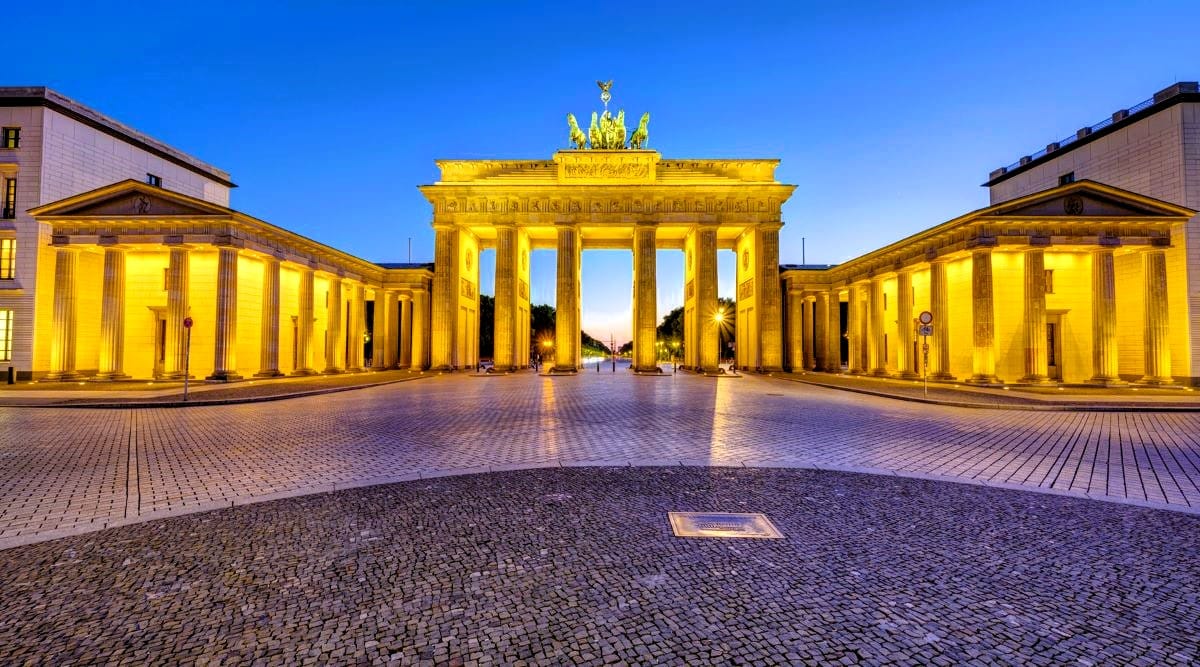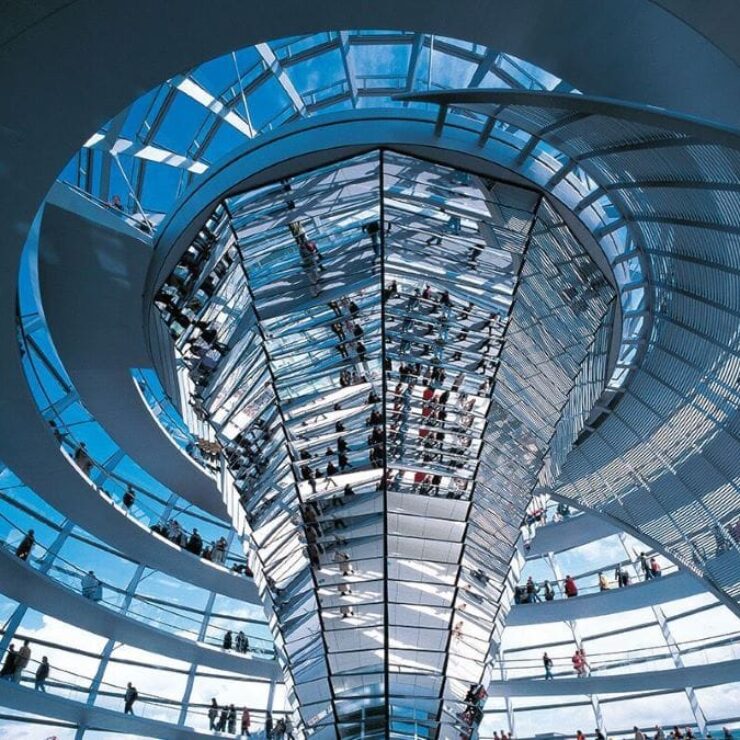The Brandenburg Gate (Brandenburger Tor in German) stands as one of Berlin’s most iconic landmarks and a powerful symbol of German unity and European peace. This neoclassical monument has witnessed over two centuries of tumultuous history and today serves as a must-visit destination for tourists and a source of pride for Berliners.
Historical Significance:
- Built between 1788 and 1791 under Prussian King Frederick William II
- Designed by Carl Gotthard Langhans, inspired by the Propylaea in Athens
- Served as a city gate and part of the Berlin Customs Wall
- Became a symbol of division during the Cold War, standing in the “death strip” between East and West Berlin
- Reopened on December 22, 1989, marking German reunification
Architectural Features:
- Height: 26 meters (85 feet)
- Width: 65.5 meters (215 feet)
- Six Doric columns on each side forming five passageways
- Topped by the Quadriga, a sculpture of a chariot drawn by four horses, driven by Victoria, the Roman goddess of victory
Key Elements:
- Quadriga:
• Added in 1793, designed by Johann Gottfried Schadow
• Removed by Napoleon in 1806, returned to Berlin in 1814 - Attica Relief:
• Depicts scenes from Greek mythology
• Includes the Goddess of Peace - Side Chambers:
• House exhibitions on the gate’s history - Pariser Platz:
• The square in front of the gate, home to several embassies and institutions
Visitor Experience:
- Walk through the central passageway, once reserved for royalty
- Explore the Room of Silence, a place for quiet contemplation
- Visit the nearby information center to learn about the gate’s history
- Enjoy street performers and artists in the surrounding area
- Witness the gate beautifully illuminated at night
Best Time to Visit:
- Early morning for fewer crowds and great photography
- Sunset for beautiful lighting
- New Year’s Eve for the famous celebration at the gate
Visitor Information:
- Open 24/7, free to visit
- Information Center hours: Daily 10:00 AM – 6:00 PM (April-October), 10:00 AM – 5:00 PM (November-March)
How to Get There from IntercityHotel Berlin Hauptbahnhof:
The Brandenburg Gate is easily accessible from your hotel using Berlin’s efficient public transportation system.
By S-Bahn (Suburban Train):
- Walk to Berlin Hauptbahnhof station (adjacent to the hotel)
- Take the S5, S7, or S75 towards Alexanderplatz
- Get off at Brandenburger Tor station
- The gate is a short 2-minute walk from the station
- Total Travel Time: Approximately 15-20 minutes
- Frequency: Trains run every 5-10 minutes
By Bus:
- From Hauptbahnhof, take bus 100 or 300 towards Alexanderplatz
- Get off at the Reichstag/Bundestag stop
- Walk about 5 minutes to the Brandenburg Gate
- Total Travel Time: Approximately 20-25 minutes
- Frequency: Buses run every 10 minutes
Walking:
- Distance: Approximately 2.5 km (1.5 miles)
- Walking Time: About 30 minutes
- Route: Follow Invalidenstraße east, then turn right onto Luisenstraße, which becomes Wilhelmstraße. The gate will be visible ahead.
Nearby Attractions:
- Reichstag Building (German Parliament)
- Memorial to the Murdered Jews of Europe
- Tiergarten Park
- Unter den Linden boulevard
Tips for Visitors:
- Visit early in the morning or late in the evening to avoid crowds
- Combine your visit with a tour of the nearby Reichstag (advance booking required)
- Consider joining a free walking tour that includes the Brandenburg Gate
- Be prepared for street vendors and crowds, especially during peak tourist season
Photography Tips:
- Best light for photography is typically early morning or during golden hour
- Night shots can be spectacular with the gate illuminated
- Wide-angle lenses help capture the entire structure
Cultural Events:
- New Year’s Eve celebration
- Festival of Lights in October
- Various political demonstrations and celebrations throughout the year
The Brandenburg Gate is not just a beautiful architectural landmark; it’s a living symbol of Berlin’s complex history and Germany’s journey towards unity and peace. Its proximity to other significant sites makes it a perfect starting point for exploring Berlin’s rich cultural and historical landscape. Whether you’re interested in history, architecture, or simply want to stand in one of Europe’s most iconic locations, a visit to the Brandenburg Gate is an essential part of any trip to Berlin.



